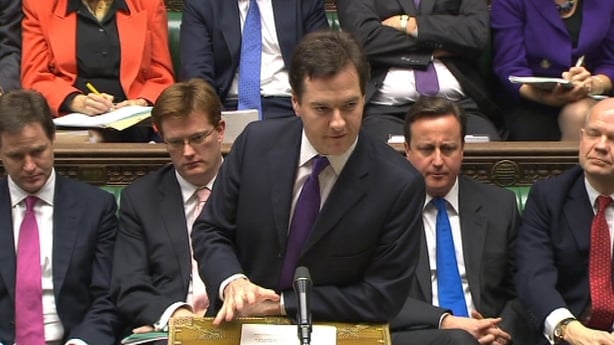British Chancellor George Osborne has pledged to create a "higher wage, lower tax, lower welfare" Britain as he unveiled the first Tory-only Budget for nearly 20 years.
The Chancellor announced plans to introduce a a new "living wage" of £9 an hour by 2020.
"Britain deserves a pay rise", he said. "The Low Pay Commission will recommend future rises that achieve the Government's objective of reaching 60% of median earnings by 2020".
The Chancellor pointed to the Greek crisis as evidence that a "bold new settlement" is needed, saying Britain was still "borrowing too much and spending too much".
"This is the new settlement from a one nation government," he said. "This is a big budget for a country with big ambitions."
Mr Osborne said the UK economy today is "fundamentally stronger than it was five years ago", with living standards rising strongly.
He said higher tax receipts meant he could implement a "smoother" path to recording a surplus in the government finances, but stressed that he would not back away from tackling the deficit.
"You only have to look at the crisis unfolding in Greece as I speak to realise that if a country's not in control of its borrowing, the borrowing takes control of the country," Mr Osborne said.
"Britain still spends too much, borrows too much, and our weak productivity shows we don't train enough or build enough or invest enough."
"This will be a Budget for working people. A Budget that sets out a plan for Britain for the next five years to keep moving us from a low-wage, high-tax, high-welfare economy; to the higher-wage, lower-tax, lower-welfare country we intend to create."
The UK's official growth forecast for 2015 was revised slightly downwards today. Growth for this year was forecast to be 2.4%, down from a forecast of 2.5% made in March, Osborne told parliament.
"That is faster than America, faster than Germany and twice as fast as France," he said.
Growth in 2016 was expected to be 2.3%, unchanged from the March forecast made by Britain's Office for Budget Responsibility.
For the rest of the decade, growth would be 2.4% a year, Osborne said.
The Bank of England has previously predicted Britain's economy will grow by 2.5% this year and by 2.6% in 2016.
Mr Osborne said the Government would record an absolute surplus of 0.5% of national income in 2019-20 - a year later than previously predicted.

He stressed that no year would see departmental cuts as deep as those imposed in the last parliament.
"Many difficult but necessary decisions are required to save money and this will be done with moderation but determination," Mr Osborne said.
The Chancellor said £37 billion of fiscal consolidation was needed during this parliament, including £12 billion of welfare cuts. He confirmed that he was looking to raise another £5 billion from cracking down on tax avoidance.
Acknowledging a well-received Labour policy from the election campaign, Mr Osborne announced that permanent non-dom tax status was being abolished.
"British people should pay British taxes in Britain, and now they will," he said.
The UK finance minister is to reduce a bank levy charged on the assets of financial institutions and replace with it with a surcharge on bank profits.
"I will, over the next six years, gradually reduce the bank levy rate - and after that make sure it no longer applies to worldwide balance sheets," he said.
"But to maintain a fair contribution from the banks, I will introduce a new 8% surcharge on bank profits from January next year."
The bank levy was introduced in 2011 in response to the financial crisis and applies to the global balance sheet assets of British banks as well as assets belonging to the UK operations of foreign banks. HSBC has said the levy will be a factor in whether it decides to keep its headquarters in Britain.
On corporation tax, the Chancellor said the rate will be cut from 20% to 19% in 2017 and to 18% by 2020.
Mr Osborne also announced reforms to UK vehicle excise duty, reducing the number of bands to three - zero, standard and premium. He said "every single penny" of revenue will be ringfenced for road projects.
Fuel duty will remain frozen this year, he said.
And in a controversial move, Mr Osborne confirmed that student grants will be replaced by loans to save £1.6 billion.
"We have removed the artificial cap on student numbers so we don't have to turn away people from our universities who want to go and have the right grades," he said.
"But we can't afford to do this unless we tackle the cost of student maintenance grants - that is set to almost double to £3 billion over this decade", he added.

The main announcements in today's UK Budget include:
- a new compulsory National Living Wage for working people aged 25 and over, starting in April 2016 at £7.20 an hour and reaching £9 an hour by 2020.
- the Office for Budget Responsibility downgraded growth forecast for 2015 from 2.5% to 2.4%, then 2.3% in 2016, then revised it up to 2.4% in 2017 and for rest of decade.
- forecast for paying down the national deficit and running a surplus knocked back by a year from 2017/18 to 2018/19.
- new Fiscal Charter committing the country to running an overall budget surplus in normal economic times - when real GDP growth is lower than 1% a year.
- UK corporation tax to be cut from 20% to 19% in 2017 and 18% by 2020.
- tax-free personal allowance at which 20 pence income tax rate is payable raised from £10,600 to £11,000 next year, while, rates of income tax remain unchanged.
- higher rate 40 pence income tax threshold to rise from £42,385 to £43,000 from next year.
- rises in public sector pay restricted to 1% per year for the next four years.
- package of welfare reforms cutting £12 billion from the system, including four-year freeze for working-age benefits.
- reduction from £6,420 to £3,850 in income level at which tax credits begin to be cut, with increase in taper rate at which the benefit is removed.
- support for children through tax credits and universal credits to be limited to two children, affecting children born after April 2017.
- benefits cap to be reduced from £26,000 per household to £23,000 in London and £20,000 in the rest of the country.
- rate of Employment and Support Allowance aligned with Jobseekers' Allowance for new claimants deemed able to work.
- permanent non-dom tax status to be abolished.
- inheritance tax reform to allow estates worth up to £1m to be tax-free if they include a home.
- new bands for vehicle excise duty for brand new cars from 2017 - with most cars paying £140 standard charge. No change to VED for existing cars. All income from VED to go into new Roads Fund to pay for investment in the network.
- climate change levy exemption for renewable electricity to be removed
- counties and elected mayors to gain power to set Sunday trading hours in their areas.

